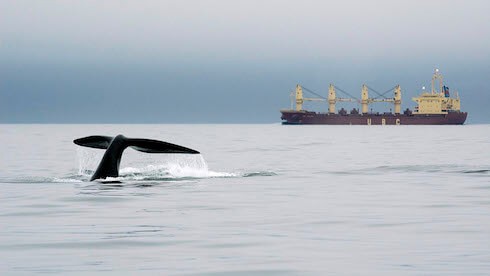Whale Alert, an application developed to reduce the risk of collisions between ships and whales, is now available in French. This application allows those navigating Canadian and US waters of the Atlantic and Pacific to obtain real-time information on the presence of whales and regulations and to share their observations with researchers and emergency networks.
Why an application to reduce the risk of collision?
When shipping routes overlap with whales’ feeding, breeding or migration areas, collisions can be a significant threat to the cetaceans, as the recent episode of right whale mortalities reminds us. The North Atlantic right whale, an endangered population living along the east coast of Canada and the United States and numbering only about 500 individuals, is particularly susceptible to ship strikes, as it feeds on the surface near the coast. Since early June, seven dead right whales have been identified in the Gulf of St. Lawrence and, according to preliminary results of the necropsies conducted, at least two of them appear to have been victims of a ship collision, judging by the hemorrhages present in their tissues. Reducing the risk of collision is therefore a priority for protecting this and other species at risk.
In recent years, measures have been implemented to reduce the risk of ship strikes, including rerouting shipping routes off Boston and the Bay of Fundy, as well as the development of a free app for iPad and iPhone called Whale Alert.
Whale Alert was inaugurated in English in April 2012 for US waters. It was initially developed to facilitate understanding and compliance with applicable regulations to protect right whales by posting these regulations on easy-to-read nautical charts on smartphones and tablets. Visual and auditory alerts also serve as reminders to captains when their ship enters a protected area. Whale Alert thus facilitates navigation in a complex network of overlapping and evolving protected areas and shipping channels.
Whale Alert has been integrating data for several other species at risk – in addition to the right whale – and covers Canadian and US waters in the Pacific and Atlantic Oceans. Additionally, with the new bi-directional interface, users can contribute directly to data collection by reporting the presence of live, dead or vulnerable animals, which is useful information for researchers and managers. And when a struggling animal is reported, this information is sent to the appropriate emergency network.
Use in the St. Lawrence
By making this application available in French, researchers hope to increase its use in the St. Lawrence. In the past few years, fewer right whales have been observed in traditional feeding areas between New England and Nova Scotia, while more have been seen in the Gulf of St. Lawrence, where there is currently a lack measures in place to mitigate the risk of collision. This application will allow captains in the St. Lawrence to locate and report the presence of whales using their smartphone, thus preventing future collisions and accelerating the implementation of intervention measures in the case of a dead or vulnerable whale. It will also enable researchers to collect data on the presence of right whales and other species at risk in this region – essential data for better understanding these cetaceans and developing appropriate strategies for cohabitation.





